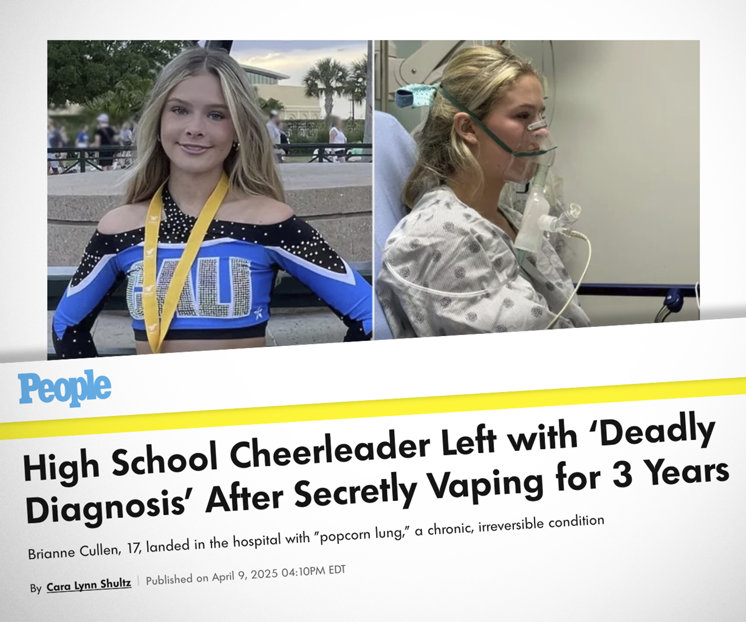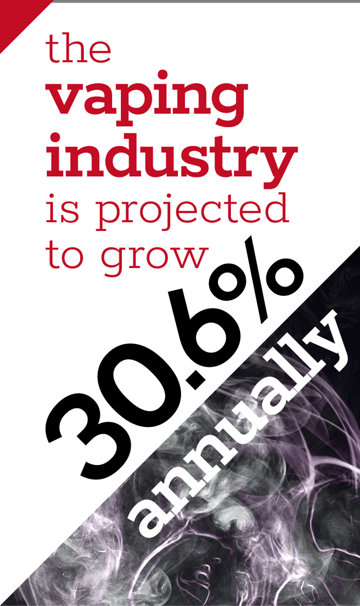Despite the flood of commercial propaganda claiming vaping is safe, the bitter truth is that it can kill you.
Vaping—inhaling battery-heated nicotine-rich flavored liquid vapor—has long been touted as a safer alternative to smoking tobacco, because “harmless,” odorless water vapor is all that is inhaled.
Harmless? Tell that to Nevada high school cheerleader Brianne Cullen, 17, who developed a crippling case of bronchiolitis obliterans, also known as “popcorn lung,” after three years of vaping.
“Does vaping cause harm to the lungs? Yes. Do vaping products contain carcinogens? Yes.”
The progressive, irreversible disease can cause cancer. It got its name from microwave popcorn workers who contracted the disease from breathing in diacetyl, an artificial flavoring. But popcorn lung is also caused by breathing in acetaldehyde, found in vaping smoke, along with formaldehyde—also found in vaping smoke, and ironically used as an embalming agent for preserving the dead.
How convenient is that? Vape, and you will be somewhat pre-embalmed. It might save some time at the funeral home.
Brianne survived and now uses an inhaler to help her breathe. Her mother, Christine Martin, said Brianne’s diagnosis “was popcorn lungs that’s permanent, and children are dying from it.”
Still believe that e-cigs and vaping are safe?

Try telling that to Jordan Brielle, 32, of Cincinnati, who had to be placed in a medically induced coma for 11 days after doctors suctioned two liters of black and bloody “vape juice” out of her lungs. The procedure saved her life, although she was left with minor brain injury.
“I would say to anyone else, quit any way you can,” she said. “Do it for your health, your family, your life, your lungs. Whatever motivates you, use that reason and stop. I wouldn’t wish what I’d been through on anyone else. I feel grateful to be alive.”
In 2024, researchers at Ohio State University found that when chronic cigarette smoking and vaping were combined, the risk of developing lung cancer was four times higher. “Our results suggest that vaping in combination with cigarette smoking accelerates the rate of developing lung cancer compared to smoking alone,” the researchers wrote.
These risks have been well known for some time—the National Academies of Science, Engineering and Medicine released a report in 2018 that found that propylene glycol and vegetable glycerin, which are toxic to cells, are commonly found in vaping liquid.
“E-cigarettes produce a number of dangerous chemicals including acetaldehyde, acrolein and formaldehyde,” their report added. “These aldehydes can cause lung disease, as well as cardiovascular (heart) disease.
“E-cigarettes also contain acrolein, a herbicide primarily used to kill weeds. It can cause acute lung injury and COPD [Chronic Obstructive Pulmonary Disease] and may cause asthma and lung cancer.”
Weed killer—just what you want in your lungs, right?
“Many young people don’t understand the risks of vaping, and e-cigarette usage is increasing in teenagers and young adults at an alarming rate.”
Cleveland Clinic researchers, among other specialists, are now calling vaping effects EVALI, or “E-Cigarette or Vaping Use Associated Lung Injury,” and pull no punches about its lethal effects, stating: “EVALI is serious. About 90% of reported EVALI cases require hospitalization. As of early 2020, EVALI was responsible for nearly 3,000 hospitalizations and almost 70 deaths.”
Vaping devices come in many shapes and sizes, sold openly in smoke shops and convenience stores, but who knows for sure what you’re putting in them. When it comes to the contents of vaping liquid, it’s the Wild West out there, and you’re on your own.
“Because the Food and Drug Administration (FDA) does not regulate vape products as strictly as traditional cigarettes, you may not always know exactly what you are inhaling into your lungs,” said Dr. Min Kim, a thoracic surgeon at Houston Methodist. “Does vaping cause harm to the lungs? Yes. Do vaping products contain carcinogens? Yes. Does vaping cause cancer in mice? The studies say yes. But does vaping cause lung cancer in people? While we can’t say for sure yet, the evidence is pointing toward yes.”
Michael DeLeon, a famed antidrug lecturer and Foundation for a Drug-Free World partner who spoke at over 800 schools in 2024 alone, was more direct: “Cancer is exploding among young people and vaping causes cancer,” he said.
Even if you’re lucky and manage to avoid cancer, there are a host of other crippling conditions that can attack your body through vaping fumes. Go ahead—take your pick.
You might contract lipoid pneumonia, with shortness of breath and a chronic cough, leaving you coughing up blood or blood-tinged mucus. Fun, huh? “There isn’t a good treatment for lipoid pneumonia, other than supportive care, while the lungs heal on their own,” says Johns Hopkins lung cancer surgeon Stephen Broderick. “The single most important thing you can do is identify what is causing it, in this case vaping, and eliminate it.”
And then there’s collapsed lung, or Primary Spontaneous Pneumothorax. “At Johns Hopkins, we’re seeing a rash of collapsed lungs in younger people. We always ask if they’ve been smoking, and they’ll often say, ‘No, I don’t smoke. But I do vape,’” Dr. Broderick said. “Now we tell patients not to smoke or vape if they want to avoid another lung collapse and surgery in the future.”
And, of course, you can become—or continue to be—hooked on nicotine, which is highly addictive, comparable to cocaine or heroin, and contained in most e-cig or vaping fluids. Just what you need, right? Another crippling addiction.

“There’s a perception that e-cigarette vapor is ‘healthier’ than cigarette smoke. But this doesn’t mean vaping is safe—or that it can help you quit smoking,” says Dr. Eric Bernicker, oncologist at Houston Methodist. “Many young people don’t understand the risks of vaping, and e-cigarette usage is increasing in teenagers and young adults at an alarming rate.”
The World Health Organization and the US Centers for Disease Control both warn about the dangers of vaping, with the CDC stating: “As of 18 February 2020, there have been a total of 2,807 cases of EVALI reported from all 50 states, the District of Columbia, Puerto Rico and the US Virgin Islands, including 68 deaths confirmed in 29 states and the District of Columbia. While the cause of these deaths has not been conclusively determined, vitamin E acetate (VEA), a common additive in ENDS (Electronic Nicotine Delivery Systems) that contains cannabis (or THC) is thought to have played a significant role in these cases of lung injury.”
So now that you know the truth about vaping, why, you ask, would anyone lie about it? Why would someone make all those false claims of safety in all those glowing ads on social media that push flavored vaping and make it appear “vapers” are cool?
Money—that’s why.
Yale says that 1.6 million middle and high school children—kids as young as 11 to 14 years old—are vaping and are usually exposed to vaping ads on social media. That’s a huge market.
Those who advertise, make and peddle vape devices and liquids don’t care about your health—they only care about putting your money in their pockets, and they are very deep pockets indeed.
How deep? How about $28.17 BILLION in 2023, projected to grow annually at 30.6 percent between now and 2030.
The profits are big enough that vaping companies, according to the Federal Trade Commission, spent $769 million in 2020 and $859 million in 2021 on advertising the low risk and glories of vaping.
So now that you know the truth, what are you going to do?






















